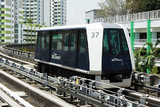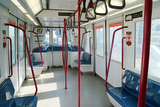Difference between revisions of "Mitsubishi Heavy Industries 810"
m |
m |
||
| (4 intermediate revisions by the same user not shown) | |||
| Line 26: | Line 26: | ||
===Cracks=== | ===Cracks=== | ||
On 9 September 2016, SBS Transit has announced that 11 trains had hairline cracks.<ref name=STCrack>[//www.straitstimes.com/singapore/transport/hairline-cracks-found-on-11-sengkang-punggol-lrt-trains "Hairline cracks found on 11 Sengkang-Punggol LRT trains"] The Straits Times (9 September 2016).</ref> This is barely 2 months after announcements that cracks were found in [[Kawasaki Heavy Industries & CSR Qingdao Sifang | On 9 September 2016, SBS Transit has announced that 11 trains had hairline cracks.<ref name=STCrack>[//www.straitstimes.com/singapore/transport/hairline-cracks-found-on-11-sengkang-punggol-lrt-trains "Hairline cracks found on 11 Sengkang-Punggol LRT trains"] The Straits Times (9 September 2016).</ref> This is barely 2 months after announcements that cracks were found in [[Kawasaki Heavy Industries & CSR Qingdao Sifang 151A|KSF(A)]] and subsequently [[Adtranz 801|801]] trains. All trains had their bogie frames replaced and strengthened to prevent similar incidents from happening again. | ||
==Design/Features== | ==Design/Features== | ||
Latest revision as of 22:36, 5 March 2024
Mitsubishi Heavy Industries C810 are the first generation of trains running on the Sengkang LRT and the Punggol LRT.
History[edit]
Between 2013 and 2015, 16 train cars were modified to be coupled for 2-car operations. Modifications are required to the signalling system and trains for dual-car service. Two seats from both ends of the train car were replaced with a signalling box, housing the new signalling equipment. The dual-car train system was commissioned for revenue service in 2015.
Cracks[edit]
On 9 September 2016, SBS Transit has announced that 11 trains had hairline cracks.[1] This is barely 2 months after announcements that cracks were found in KSF(A) and subsequently 801 trains. All trains had their bogie frames replaced and strengthened to prevent similar incidents from happening again.
Design/Features[edit]
| Initial | ||
|---|---|---|
M
| ||
| Exterior Design | ||
| Livery | Navel Blue | |
| Train Run Number | N/A | |
| Interior Design | ||
| Seating Capacity | Original | Modified |
| 18 | 14 | |
| Wheelchair Bay | N/A | |
| Door Closing Indicator Lights | N/A | |
| System | ||
| Safety System | ATC, ATO, ATP, ATS | |
| Signalling System | Fixed Block | |
| Traction Control | IGBT-VVVF (Mitsubishi) | |
Fleet Numbering[edit]
The car numbers of the trains range from 01 to 41.
References[edit]
- ↑ "Hairline cracks found on 11 Sengkang-Punggol LRT trains" The Straits Times (9 September 2016).
| [ V • T • E ] | ||
|---|---|---|
| Overview | History • Stations • Fare and Ticketing • Facilities • Safety • Security | |
| Lines | Bukit Panjang LRT • Sengkang LRT • Punggol LRT | |
| Rolling Stocks | 801 • 801A • 801B • 810 • 810A | |
| Future810D | ||
| Depots | Sengkang • Ten Mile Junction | |
| [ V • T • E ] | ||
|---|---|---|
| Stations | Sengkang | |
| East LoopCompassvale • Rumbia • Bakau • Kangkar • Ranggung | ||
| West LoopCheng Lim • Farmway • Kupang • Thanggam • Fernvale • Layar • Tongkang • Renjong | ||
| Rolling Stock | 810 • 810A • 810D | |
| Depots | Sengkang | |
| Others | Bridging Service | |
| [ V • T • E ] | ||
|---|---|---|
| Stations | Punggol | |
| East LoopCove • Meridian • Coral Edge • Riviera • Kadaloor • Oasis • Damai | ||
| West LoopSam Kee • Teck Lee • Punggol Point • Samudera • Nibong • Sumang • Soo Teck | ||
| Rolling Stock | 810 • 810A • 810D | |
| Depots | Sengkang | |
| Others | Bridging Service | |

